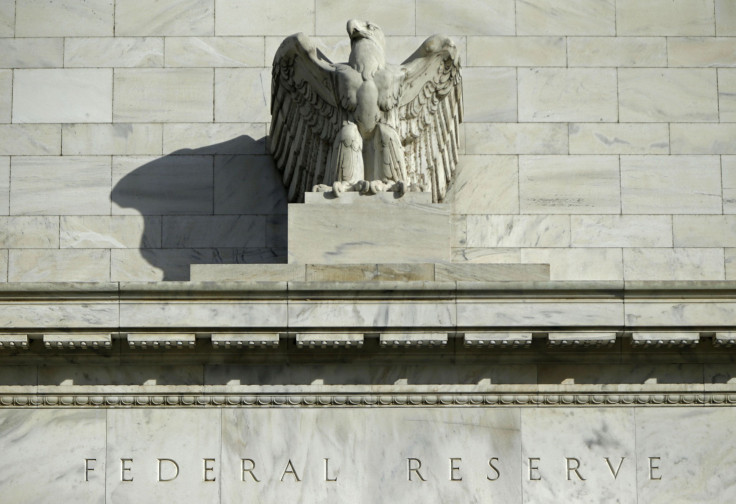Wall Street's Week Ahead: After Abenomics Survives Japan's Snap Election, All Eyes On FOMC Meeting

This week could be another volatile period in global financial markets, following Japan’s snap elections Sunday, in which Prime Minister Shinzo Abe and his ruling Liberal Democratic Party maintained a supermajority. Coming Tuesday, the U.S. Federal Reserve will hold its final policy meeting of the year, as global crude oil prices continue to decline.
Japan held its snap elections Sunday after the world’s third largest economy unexpectedly fell into recession last quarter. The vote tally gave Abe a renewed mandate for a his multipronged economic recovery strategy. Even so, "the key is if he can grow [the economy],” Bart van Ark, chief economist and chief strategy officer at The Conference Board, said to International Business Times. “If he doesn't, his position and the general credibility of the reflationist approach may not have benefited much from this adventure.”
Abe's economic revitalization program known as “Abenomics” has come under scrutiny. Data last week revealed Japan’s gross domestic product for the third quarter contracted at an annualized 1.9 percent rate, higher than the initial 1.6 percent annual rate reported last month, igniting concerns about Abe's efforts to spur growth.
Despite Japan’s weakness, the recession has had fairly limited implications for the international trade channels, van Ark said. “Japan's global competitive strength in key technology sectors remains largely unaffected. But the impact of the contraction can be more significant in terms of confidence beyond Japan itself, in particular in other mature economies who worry about facing a similar fate of long-term stagnation as Japan,” van Ark said.
U.S. stocks wavered Monday, following the previous week’s declines, as energy will continue to be watched this week after U.S. crude oil prices fell below $58 a barrel Friday for the first time since May 2009.
But following Japan’s snap election, all eyes will be focused on the Fed’s meeting later this week. The Federal Open Market Committee (FOMC) is set to meet for its final two-day policy meeting Dec. 16-17 to discuss the timing of a possible increase in interest rates, which most economists anticipate will happen in the middle of 2015. Following the meeting, Fed Chair Janet Yellen is scheduled to hold a press conference Wednesday at 2 p.m. EST. Economists will be looking for hints as to when the central bank may begin to hike rates.
“It’s increasingly likely that the phrase ‘considerable time’ may be dropped from the Fed’s statement and replaced with another form of forward guidance that is less prescriptive as to when the first rate hike may occur,” said Terry Sandven, chief equity strategist at U.S. Bank Wealth Management.
Economists will also get a closer look into the health of the U.S. economy as consumer prices, a key gauge of inflation, is released Wednesday. The Consumer Price Index, which the Fed watches to assess price changes associated with the cost of living, is expected to fall 0.1 percent in November after the Index was unchanged at 0.1 percent in October, according to analysts polled by Thomson Reuters. The CPI data comes after data last week showed producer prices in the U.S. declined last month.
The first rate hike from the Fed is likely to occur in June 2015, but the pace of subsequent rate hikes is likely to be measured in small increments, according to Sandven. “We think it will take time before the Fed gets to a normalized interest rate environment, and that’s likely to extend out to 2016,” Sandven said.
The Bank of Japan is also scheduled to hold a press conference Friday regarding its monetary policy. Japan stunned the global financial markets in October after the Bank of Japan significantly expanded its monetary stimulus program to 80 trillion yen, or $724 billion, up from 60 to 70 trillion yen. Looking ahead, the biggest risk from Japan’s recession is the uncertainty when the fiscal situation and the unsustainable debt position becomes intolerable, according to van Ark.
“Even with debt being largely held domestically, there is no reason to derive comfort from that in the longer term. At the some point, it will become impossible to compensate the savers,” van Ark said. “A significant downgrading of Japan's creditworthiness could shatter financial markets.”
Here's the latest economic calendar for the week of Dec. 15. All listed times are EST.
Monday, Dec. 15
8:30 a.m. -- Empire state index (Dec.)
9:15 a.m. -- Industrial Production (Nov.)
9:15 a.m. -- Capacity utilization (Nov.)
10 a.m. -- Home builders' index (Dec.)
Tuesday, Dec. 16
8:30 a.m. – Housing starts (Nov.)
9:55 a.m. – Markit flash PMI (Dec.)
Non-U.S.:
U.K -- Consumer Price Index (Nov.)
Germany -- ZEW Survey of Economic Sentiment (Dec.)
Wednesday, Dec. 17
8:30 a.m. -- Consumer price index (Nov.)
2 p.m. -- FOMC statement
2:30 p.m. -- Janet Yellen press conference
Non-U.S.:
U.K. –Bank of England publishes minutes from its last policy meeting
Europe -- Consumer Price Index (Nov.)
New Zealand -- Gross Domestic Product (Q3)
Thursday, Dec. 18
8:30 a.m. -- Weekly jobless claims
10 a.m. – Philly Fed (Dec.)
10 a.m. – Leading indicators (Nov.)
Non-U.S.:
Australia -- Unemployment rate (Nov.)
Switzerland -- Swiss National Bank interest rate decision; press conference
Friday, Dec. 19
No major U.S. economic data scheduled.
Non-U.S.:
Japan – Bank of Japan Press Conference/Monetary policy statement
© Copyright IBTimes 2024. All rights reserved.




















